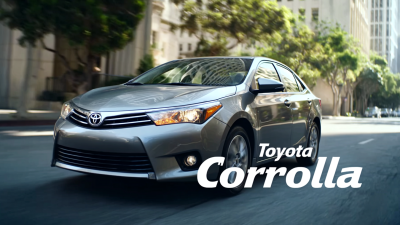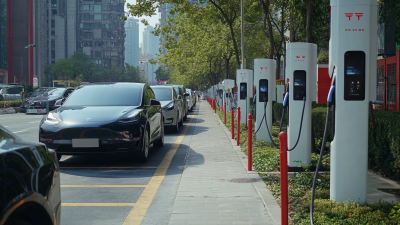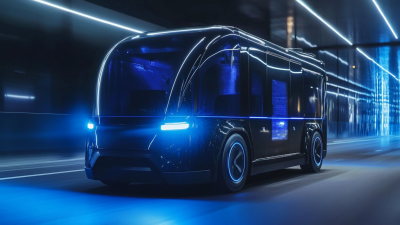Leave Your Message
In today's fiercely competitive automotive market, Auto Dealers are faced with the challenge of adapting to rapidly changing consumer behaviors and technological advancements. According to a recent study by McKinsey & Company, dealerships that embrace digital innovations can increase customer engagement by 30% and boost sales performance significantly. Furthermore, a report from the National Automobile Dealers Association highlights that nearly 80% of consumers conduct online research before visiting a dealership, underscoring the necessity for Auto Dealers to implement effective digital strategies. As consumer expectations evolve, mastering the art of leveraging digital tools and data analytics becomes paramount for sustaining success in this landscape.

This blog will delve into essential strategies that Auto Dealers can adopt to navigate the complexities of the market, ensuring they remain competitive and profitable.
In today’s fast-paced automotive market, leveraging digital tools has become essential for dealerships looking to thrive in a competitive landscape. One of the top trends is the increasing reliance on social media as a platform for engaging with potential customers. Dealerships can effectively showcase their inventory, promote special offers, and share success stories directly with audiences. Utilizing targeted advertising on platforms like Facebook and Instagram allows dealers to reach specific demographics, ensuring that promotions resonate with the right audience.
Another significant trend is the use of data analytics to refine marketing strategies. By analyzing customer behavior and preferences, auto dealers can tailor their campaigns for better efficiency and greater impact. Tools that track website traffic and engagement metrics empower dealerships to optimize their online presence and make informed decisions regarding inventory management and promotional activities. Furthermore, incorporating video content into online marketing efforts can significantly enhance engagement levels, allowing prospective buyers to virtually tour vehicles and understand unique features before setting foot on the lot. These digital advancements are not just trends; they are vital components for building lasting customer relationships and achieving sustained success in the automotive market.
Understanding consumer behavior is crucial for auto dealerships aiming for success in today's highly competitive market. According to a recent report by J.D. Power, 78% of car buyers conduct online research before visiting a dealership, highlighting the importance of a strong digital presence. Dealerships that leverage this data can enhance their online strategies to target potential customers effectively. By optimizing their websites with user-friendly navigation and relevant content, dealerships can significantly increase their chances of attracting and converting leads into sales.
Moreover, a study by McKinsey & Company revealed that 70% of consumers prefer engaging with dealerships that offer a seamless omnichannel experience. This means that dealerships must integrate their online and offline efforts, ensuring that customers receive consistent information and support across all platforms. By using consumer behavior analytics, dealerships can tailor their marketing strategies, promotions, and customer service approaches to meet the evolving needs of their target audience. Understanding these insights is not only about enhancing customer experience but also about building long-term relationships that drive success in the automotive industry.
| Metric | Value | Industry Average | Trends |
|---|---|---|---|
| Average Customer Age | 45 | 42 | Increasing |
| Percentage of Female Buyers | 38% | 35% | Stable |
| Online Research Influence | 70% | 65% | Increasing |
| Post-Purchase Satisfaction Rating | 4.5/5 | 4.2/5 | Improving |
| Time to Purchase (Days) | 42 | 45 | Decreasing |
In today's fast-paced automotive market, innovative financing options have become essential for auto dealers aiming to meet the evolving needs of car buyers. With a growing emphasis on affordability and flexibility, dealerships must offer more than just traditional financing methods. By showcasing diverse loan options, such as lease-to-own plans and flexible monthly payment structures, dealers can cater to a wider audience, including first-time buyers and those with less-than-perfect credit histories.
Moreover, embracing digital tools to enhance the financing process can significantly improve the customer experience. Online pre-approval systems empower buyers by providing immediate feedback about their financing options, helping them make informed decisions before stepping foot in a dealership. Additionally, partnering with multiple financial institutions allows dealers to present a variety of packages tailored to individual customer needs, creating a competitive edge in a crowded marketplace. Adapting to these innovations not only builds trust with consumers but also drives sales and fosters long-term loyalty in an ever-changing automotive landscape.

In the competitive landscape of auto dealerships, enhancing customer experience is paramount for fostering loyalty and encouraging repeat business. A personalized approach can significantly impact client satisfaction. By leveraging data analytics, dealers can gain insights into customer preferences and behaviors, allowing them to tailor their services and communications accordingly. This can include customized follow-up after a purchase, targeted promotions based on previous buying habits, and creating a welcoming atmosphere in the showroom that makes every customer feel valued.
Moreover, investing in staff training to improve customer interactions is crucial. Employees should be equipped not only with product knowledge but also with the skills to empathize and connect with customers on a personal level. Implementing a robust feedback loop allows dealerships to listen to customer concerns and adjust accordingly, ensuring they are constantly improving the service experience. This commitment to excellence not only satisfies current customers but also encourages them to return and refer others—creating a sustainable cycle of loyalty in a competitive market.

In today's fiercely competitive automotive market, understanding and capitalizing on competitor weaknesses can provide auto dealers with a significant edge. According to a report by J.D. Power, nearly 50% of consumers indicate that dealership reputation significantly influences their purchasing decisions. This highlights an opportunity for dealers to focus on building a solid reputation in areas where competitors may falter, such as customer service or online presence. By analyzing customer feedback and service scores, dealers can identify gaps in their competitors' offerings and tailor their strategies to outperform them.
Furthermore, research from Edmunds shows that almost 70% of buyers conduct their research online before visiting a dealership. By leveraging this insight, auto dealers can optimize their digital marketing strategies to attract customers drawn to competitors' weaknesses, such as inadequate online engagement or slow response times. Investments in robust online platforms and timely communications can enhance a dealer's visibility and appeal, ultimately leading to higher conversion rates. By meticulously analyzing their competitors' online footprints and customer touchpoints, auto dealers can create targeted marketing campaigns that directly address those weaknesses, ensuring they stand out in a crowded market.






